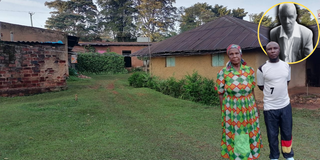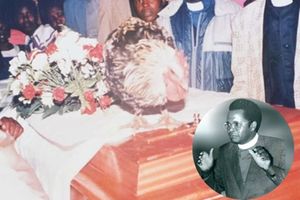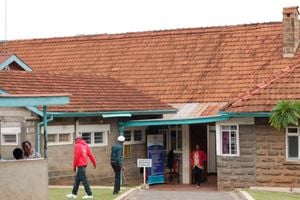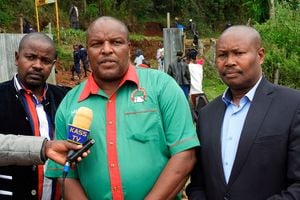
A family in Vihiga County has been unable to bury their loved one for four years after the county government went to court to oppose the burial, claiming ownership of the deceased's land.
The family has been waging a 30-year battle with the Vihiga County government - formerly a municipality - to prevent their land from being seized by the authorities.
Hezekiah Mavisi Ondego, 83, who died on November 11, 1985, was first asked by Vihiga Municipality to surrender his land for the construction of the county headquarters in 1985.
In 1988, the Ondego family was again ordered to move to an alternative settlement in Lugari, Kakamega County.
Philip Odari, Mzee Ondego's son, revealed that when the family visited the land earmarked for them in Lugari (Mautuma Central Settlement Scheme/1397), they discovered that it was already owned by another family.
“My father visited the land, and the municipality realised it was owned by someone else,” said Mr Odari.
He told how his father, accompanied by a friend, was attacked by the new owner of the land and others, resulting in his father losing his hearing and his companion breaking a leg.
A doctor's letter from 1988 confirmed the injuries.
Despite this, the family filed a report with the District Officer of Vihiga, Mr Herbert Asava, and remained on the land until 2012, when devolution led to the establishment of a county government.
The devolved system led to a new campaign, with the new administration urging more than 15 families, including the Ondegos, to vacate the land.
The late Ondego’s widow, Grace Imali Masivi, 82, explained that although some families moved, the majority stayed and sold their land to investors in the county.
“My husband and I saw no reason to relocate because we didn’t want to be squatters. Even after reporting the issue, the district officer at the time suggested that we might have given the land to someone else, but that was not the case,” said Mrs Masivi.
The Ondego family states that they owned the land parcel South Maragoli/Bugonda/2097, refused to accept the government's offer and chose to subdivide their land among their children.
In 2013, during the tenure of Governor Moses Akaranga, the county government insisted they move to Lugari to allow for the construction of county offices.
The family took their case to the Kakamega Court in 2017, where it was listed under the Environment and Land Court.

The petitioners said they were using the land for both personal and commercial purposes.
“On March 13 and 14, 2017, the respondent, accompanied by eight enforcement officers, came to the petitioner’s land with intentions to demolish houses and erect a barbed-wire fence,” the petitioners stated in High Court petition.
In a ruling delivered on November 27, 2019, Justice Nelly Matheka dismissed a petition filed by eight individuals challenging the government’s compulsory land acquisition process.
The court found that the first petitioner had been compensated fairly with alternative land in exchange for their land at South Maragoli/Bugonda/2097.
It was also found that the first petitioner had later subdivided the land and transferred portions to third parties, which the court deemed fraudulent.
The court also ruled that the petitioners were guilty of fraud and misrepresentation and that the titles they held were obtained illegally, in violation of constitutional principles regarding property rights.
The court emphasised the provisions of Article 40(6) of the Constitution, which excludes properties obtained through unlawful means. Despite the court ruling, the family continued to live on the land.
The late Ondego was expected to be buried on November 21, 2020, in the land he claimed was his, but the county government filed a case a day before— on November 20, 2020 — seeking to stop the burial.
Now, the family is requesting the Vihiga County government to hold a meeting with them to resolve the issue and allow them to bury their loved one.
“We are not refusing to move. We proved that the land we were given belongs to someone else, and they never offered us an alternative. Our neighbours, who were also told to vacate, sold their land to investors without being harassed. Why are we the only ones being targeted?” Mr Odari said.
He added that his mother, Grace Imali Masivi, was suffering from stress as a result of not being able to bury her husband. He also said she has to visit the Vihiga County Referral Hospital morgue every month to see her husband's body.
Nation.Africa spoke to the Vihiga County Minister for Lands and Housing, Victor Kivaya Cheye, who referred us to the County Attorney, Aggrey Misega.
“There is no dispute here. The court made its ruling, and we cannot allow the deceased to be buried on land that belongs to the government,” said Mr Cheye.
Mr Misega explained that there would be no changes for now and reaffirmed that the land is owned by the County government.
He confirmed that the family had earlier relocated to Lugari and later returned to the land that had been abandoned for five years.
“The family has been evading relocation elsewhere. The County's position follows a 2019 ruling by the Kakamega court that the land does not belong to them. If they expect to be compensated again, the government cannot do so,” said Mr Misega.
He said even though the family had sought redress from the court to prevent the county from blocking burial, the family was offered a chance to inter the body in Vihiga cemetery.
“The family refused the offer we gave them. We cannot allow them because the county government is planning to construct other offices on that land,” said Mr Misega.
The Ondego family is still hoping that the county government will show mercy and allow them to bury their patriarch according to the custom and tradition of the Maragoli culture.
They believe that the spirits of the deceased rest among their ancestors. This not only shows respect for the dead, but also gives credibility to the relationship between the living and their descendants.
Failure to do so with a loved one brings dishonour and may bring misfortune, as the spirit is said to wander or remain unfulfilled.












